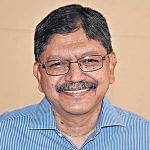The National Statistical Commission’s (NSC) acting chairperson P.C. Mohanan and member J.V. Meenakshi have resigned over the delay in publishing the NSSO jobs report despite it being approved by the panel. They said they were being “sidelined” by the government.
ThePrint asks: Members of govt stats body quit over jobs report: Another agency damaged or overreaction?
The whole idea of National Statistical Commission was to keep an arm’s length between govt and govt data
 Pronab Sen
Pronab Sen
Former Chairman, National Statistical Commission
The National Statistical Commission is yet another public institution that has succumbed to governmental pressure. It was a fairly new agency that was just beginning to build its credibility, which is now in peril.
The previous NDA government appointed the Rangarajan Committee, which went on to recommend the NSC, and the NDA accepted that recommendation. But it was the UPA government who actually created the NSC; so the body had bipartisan support.
The whole idea was to have a system through which an arm’s length between the government and government data can be maintained.
The public at large had to be given the confidence that government data was not being contaminated by political parties.
I believe the members began to feel sidelined even before the backdated GDP data was released, but that and the report on jobs not being released yet pushed them over the edge.
If I would’ve been in their place, I would’ve resigned on the backdated GDP data being released alone. The data wasn’t even shown to the NSC, but was taken to the Niti Ayog, thereby taking away the authority from the NSC.
Then, the NSSO employment survey not being released proved to be the last straw. In all NSSO matters, the NSC is the final word. The NSC approved that report for release back in December 2018, and that should’ve been the end of the discussion.
Two months have passed, the report has still not been released, and now the CSI is saying they will release it only when they have a quarterly estimate– in effect pushing the release to April.
The NSC members have sufficient justification to resign.
Govt should have released jobs report & then expressed its views on it in the public domain
 Radhika Pandey
Radhika Pandey
Consultant, NIPFP
Trouble had been brewing ever since the NSC raised concerns over the role of the Niti Aayog in the release of the back-series of GDP.
Official statistics is a public good. It serves as a foundation for research and intellectual debate on the state of the economy and serves as a guidepost for policy priorities.
While the government has maintained that CSO is an independent body, the active involvement and defence by the government-sponsored think-tank in relation to the GDP back-series do raise concerns over the independence of the CSO and the role of the NSC, whose task is to monitor and review the functioning of the statistical system.
On the jobs front, it is widely known that job data is problematic. Even if the government had a different view on the NSSO’s employment survey, it should have released the report in the public domain and then expressed its views on the survey report in the public domain. This could have generated a public debate on the quality and sources of data, potentially paving way for improvements in the quality of jobs data.
Withholding data and consequent resignation by the NSC members raise speculation that government is meddling with the findings of the data.
Perceived lack of autonomy of an institution impacts credibility of govt data
 Narendar Pani
Narendar Pani
Professor, National Institute of Advanced Studies
Coming after a series of missteps by the government in the domain of official statistics, the resignation of the two non-government members of the National Statistical Commission is a serious blow to the credibility of the numbers the government puts out.
There may be some official institutions where autonomy from the government is not a particular concern. For instance, institutions charged with flood relief may well see governmental interference as a sign of commitment. But institutions that monitor the government – and statistics are a primary tool of such monitoring – lose much of their credibility if they are not autonomous. It would be no surprise then if the perceived lack of autonomy has a debilitating impact on the credibility of the numbers the government puts out.
The official disdain for the credibility of government data in an election year suggests rather cynical political thinking. The government probably thinks that this loss of credibility will confine the statistical data to only the middle class who is bothered about such issues and it will not spill over into the larger electorate. But if it does, the ruling party could find itself in the middle of an election campaign where even it legitimate statistical claims are taken with a pinch of salt.
If India has to become a knowledge economy, then we need our data systems in place
 Nirupama Soundararajan
Nirupama Soundararajan
Senior Fellow, Pahle India Foundation
The recent resignation of members from the NSC is symptomatic of two issues in India, and these issues go beyond the government. First, can data from India be trusted? Second, are policies in India crafted based on data?
A senior policymaker once told me that data analysts abroad apply a discount factor of 5 per cent on data that comes from India. While one could argue the merits of the number, what is worrisome is the signal that we have somehow sent that our data is not robust.
Now, in all honesty, questionable data sets are not always on account of questionable integrity. Most often it is because of inefficient and inadequate data collection systems. This also resoundingly answers the second question. India’s policies cannot always be data-driven, because our data collection systems are very poor.
Data is sacrosanct and data in itself is an absolute truth. Like dharma, it can mean different things under different circumstances, but it cannot morph into something that it is not. Any serious researcher will agree. If India is serious about becoming a knowledge economy, then we better get our data systems in place.
Govt has constantly bypassed NSC while taking important decisions on India’s core statistics
 Remya Nair
Remya Nair
Senior associate editor, ThePrint
The government has over the last one year consistently sidelined the National Statistical Commission by choosing to bypass the body completely while taking important decisions related to India’s core statistics.
The NSC was envisaged as a statutory body by the Rangarajan panel, who would have the final say on all statistical methodologies, surveys and data collection independent of the government, when it comes to policy making and maintaining the quality of data.
However, the body is yet to become truly independent, with the government nowhere close to bringing a legislation to provide statutory status to the commission.
This has brought us to the current situation wherein the commission is constantly ignored in contravention of existing rules raising questions about the sanctity of India’s statistical releases. The NSC was not kept in the loop by the government while releasing the back-series GDP data through the Niti Aayog that completely alters India’s growth rates for seven years till 2011-12 — a first since growth rates have never been yet altered in previous back-series data calculations.
Holding back the NSSO 2017-18 round employment and unemployment data over which the NSC has the final say has further undermined the NSC. The fact that the NSC is not even consulted by the government while initiating work on the seventh economic Census is in direct violation of existing rules shows that NSC has now become defunct.
By Fatima Khan, journalist at ThePrint. You can follow her on twitter @khanthefatima.




I shudder to think of the condition of the country if Modiji is re-elected for another five year term.
This is only over reaction nothing else. How any agency can collect data in vast country like India ! Methodology of data collection is in itself questable. Above article didn’t mention this point. After all government is accountable to people. What people think they will decide. Opposition is claiming there is no job government feel they have created enough job. Fact is number of people enged in business like job but they are not on record.